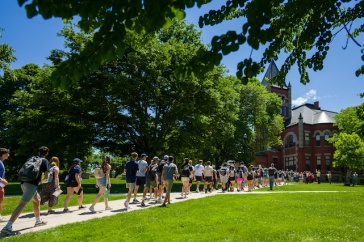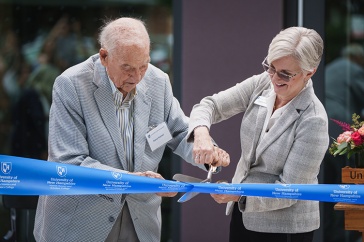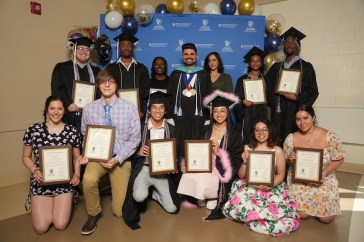
Nancy Targett is passionate about connecting people and ideas. It’s a philosophy that guided her at the University of Delaware, where she joined the faculty in 1984 and was named dean of its College of Earth, Ocean, and Environment in 2005. That desire to bring people together and connect ideas across disciplines will be central to her work as UNH’s new provost and vice president for academic affairs. A nationally recognized oceanographer, Targett says she never expected to leave Delaware but couldn’t pass up the chance to come to UNH: “When I talked to everyone here and saw the genuineness of the people, the passion of the people for what they can accomplish here, it spoke to me. I thought: This is a place I can fit in and be a part of the team, where I can make a difference.”
Q. What opportunities for academics and other programs do you see in UNH’s future?
A. The academic landscape is changing across the nation, and universities are positioning themselves to do their best to carry on their mission, which is to inspire and transform students. UNH is an institution that’s been very dynamic in terms of how it’s positioning itself. It’s a time when there are serious resource constraints, and so the university has done a lot to streamline, be more efficient and deliver a quality education to students in a way that resonates with them. In the 21st century, that means more hands-on experience, thinking about the academic roadmap students are going to be on and how they can do internships and so on in their areas of interest, so that they have experience when they leave here to get jobs. I see my job as building on the excellence that’s already here.
Q. What are some of the challenges that come with those opportunities?
A. You have to put resources at the top of the list of challenges. If we had an infinite supply of resources, we could probably work through the many issues we have in an easy way. But the fact that we don’t have an infinite supply of resources means there are not only challenges, but also opportunities, because this forces us to think creatively about how we do things. One really critical thing is that we continue to think about how we can work more collaboratively. We want to have depth in our disciplines, but we also want to have people who can communicate across those disciplines and work together. And we can train our students to do that, because that’s what the public and private sectors are looking for.
“There are three things I think are critical: inspiring and transforming our students; creating new knowledge through research and scholarship; and forging partnerships.”
Q. How can the university encourage that kind of collaboration?
A. I’m only just starting here, so I’m doing a lot of listening and I’m seeing connections. What I’d like to do is see threads that can be pulled through to unite a lot of sectors — can we involve students, both undergrads and graduates? Can we involve a lot of different people to each bring in their research expertise, and can it have outcomes that engage the public and private sector? There are several areas where I already see the opportunity to connect the dots in a way that will enhance what we already have at UNH.
Q. What are some ways UNH can better engage the public sector and get the research that’s being conducted here out into the world?
A. One way is to enhance the way we appear to the outside world, in terms of portals to the university. We need to make it easy for people to find out about us — a lot of times, people are looking for a partnership with the university, but they don’t know exactly how or where to go. Having portals with a common entry point you can direct people to would be really valuable.
And partnerships are important. There are three things I think are critical: inspiring and transforming our students; creating new knowledge through research and scholarship; and forging partnerships. Universities don’t do this alone — we do it in partnership with the community and with businesses, and more than ever, that is critical.
Originally published in UNH Magazine Winter 2017 Issue
-
Written By:
Larry Clow '12G | UNH Cooperative Extension



















































